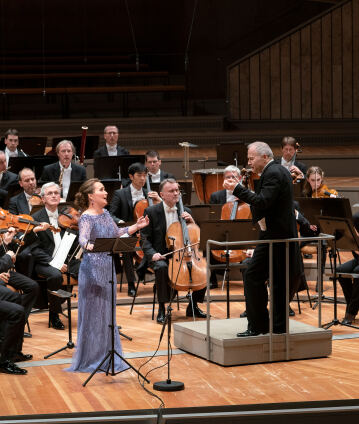Works by Mozart and Haydn with Adam Fischer and Julia Lezhneva

He has conducted an acclaimed Ring in Bayreuth, is a guest of the foremost symphony orchestras and an honorary member of the Wiener Staatsoper – and yet: Adam Fischer is still considered one of the conducting world’s best kept secrets. The audience of the Berliner Philharmoniker can now experience him conducting symphonies by composers who are particularly close to his heart: Wolfgang Amadeus Mozart and Joseph Haydn. The highly virtuoso soprano Julia Lezhneva is also a guest as the soloist in a Mozart aria and a Haydn cantata.
In February 2018, Adam Fischer debuted with the Berliner Philharmoniker – hailed by the audience with prolonged applause, and praised to the skies by the press: “Hardly anyone could resist” Fischer’s interpretation of Antonín Dvořák’s symphony From the New World, Der Tagesspiegel judged at the time: he conducted the legendary work “engaging his whole body [and] with an exact musical imagination”.Fischer, whose younger brother Iván played a leading role in Berlin’s musical life between 2012 and 2018 as principal conductor of the Konzerthausorchester, will now return to conduct the Berlin Philharmonic – with a programme dedicated entirely to the music of two composers who have always been very important to him: Joseph Haydn and Wolfgang Amadeus Mozart.
Fischer founded the Haydn Philharmonic, which is made up of Austrian and Hungarian musicians, in 1987. It sent a political signal two years before the watershed year 1989, and achieved a first artistic high point with the multi-award-winning recording of all Haydn’s symphonies. Fischer first came into contact with Mozart’s music when he sang the role of one of the three child-spirits in the Magic Flute at the Hungarian State Opera in Budapest as a young boy. Many years later, the recording of all Mozart’s symphonies with the Danish National Chamber Orchestra released in 2013 was a long-term project for the conductor, who is active around the world.
The key elements of the programme that Fischer has compiled for these Berlin Philharmonic concerts are Mozart’s Linz Symphony in C major K. 425, composed in 1783 and named after the place of its premiere, and Haydn’s Symphony No. 104 in D major, first performed in London twelve years later, with which the composer marked a witty end to his symphonic work.
Two vocal compositions make up the centre of the evening: the concert aria for soprano, piano obbligato (played by Adam Fischer) and orchestra K. 505, which Mozart composed in Vienna in 1786 for the English soprano Nancy Storace, and the dramatic scene and aria “Berenice, che fai”, with which Haydn paid musical tribute in 1795 to the artistry of an Italian prima donna acclaimed in London. The young Russian soprano Julia Lezhneva can be experienced as the soloist in both of these expressive, breakneck vocal compositions; she is making her debut with the Berliner Philharmoniker at these concerts.
© 2019 Berlin Phil Media GmbH
Related interviews